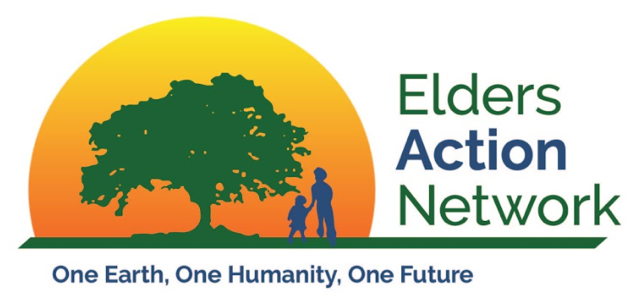Previous Book Study Group Selections
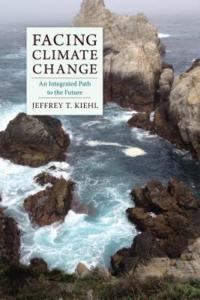 Jeffrey Kiehl, Facing Climate Change – An Integral Path to the Future
Jeffrey Kiehl, Facing Climate Change – An Integral Path to the Future
In this book Jeffrey Kiehl explains why people refuse to accept evidence of a warming planet and shows how to move past unconscious mental blocks to reach a consensus for action. As a climate scientist and licensed Jungian analyst, he examines the psychological phenomena that twists our worldview and shapes the cultural beliefs that disconnect us from the living Earth. He also accounts for the emotions triggered by the fears of climate change and the anticipatory anxiety that leads us to deny the reality of our warming planet. The connections made between human psychology and the global crises stimulated much discussion and a new awareness of our role as humans. Our final meeting with the author inspired us all to integrate the inner and the outer in pursuit of a regenerative future.
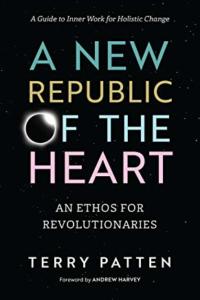 Terry Patton, A New Republic of the Heart
Terry Patton, A New Republic of the Heart
Recasting current problems as emergent opportunities, Terry Patten offers creative responses, practices, and conscious conversations for tackling the profound inner and outer work we must do to build an integral future. In practical and personal terms, he discusses how we can all become active agents of a transformation of human civilization and why that is necessary to our continued survival. A New Republic of the Heart provides a comprehensive understanding and inspiring vision for “being the change” in a way that can address the most intractable problems of our time. Patten shows how we can come together in our communities for conversations that matter and describes new communities, enterprises, and forms of dialogue that integrate both inner personal growth work with outer awareness, activism, and service.
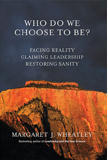 Margaret Wheatley, Who Do We Choose To Be? Facing Reality | Claiming Leadership | Restoring Sanity
Margaret Wheatley, Who Do We Choose To Be? Facing Reality | Claiming Leadership | Restoring Sanity
In the author’s words: “This book is born of my desire to summon us to be leaders for this time as things fall apart, to reclaim leadership as a noble profession that creates possibility and humaneness in the midst of increasing fear and turmoil. I know it is possible for leaders to use their power and influence, their insight and compassion, to lead people back to an understanding of who we are as human beings, to create the conditions for our basic human qualities of generosity, contribution, community and love to be evoked no matter what. I know it is possible to experience grace and joy in the midst of tragedy and loss. I know it is possible to create islands of sanity in the midst of wildly disruptive seas. I know it is possible because I have worked with leaders over many years in places that knew chaos and breakdown long before this moment. And I have studied enough history to know that such leaders always arise when they are most needed. Now it’s our turn.” —Margaret Wheatly
Towards A New Future
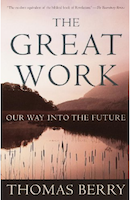 Thomas Berry, The Great Work
Thomas Berry, The Great Work
This book urges us to move from being a disrupting force on the Earth to a benign presence. This transition is the Great Work — the most necessary and most ennobling work we will ever undertake. Berry’s message is not one of doom but of hope. He reminds society of its function, particularly the universities and other educational institutions whose role is to guide students into an appreciation rather than an exploitation of the world around them. Berry was the leading spokesperson for the Earth, and his profound ecological insight illuminates the path we need to take in the realms of ethics, politics, economics, and education if we humans and all of life are to survive.
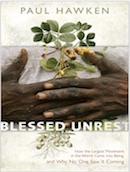 Paul Hawken, Blessed Unrest
Paul Hawken, Blessed Unrest
This is an examination of the worldwide movement for social and environmental change – restoring the environment and fostering social justice. It is made up of numerous groups of all sizes and descriptions; they collectively comprise the largest movement on Earth, a movement that has no name, leader, or location, and that has gone largely ignored by politicians and the media. It explores the diversity of the movement, its brilliant ideas, innovative strategies, and hidden history. Fundamentally, it is a description of humanity’s collective genius, and the unstoppable movement to reimagine our relationship to the environment and one another.
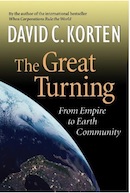 David Korten, The Great Turning
David Korten, The Great Turning
“Empire,” the organization of society through hierarchy and violence has always resulted in misery for the many and fortune for the few, but now it threatens the very future of humanity as Empire has become unsustainable and destructive. Korten traces the roots of Empire and charts the evolution of its instruments of control, from absolute monarchies to the multinational institutions of the global economy. He describes efforts to develop democratic alternatives to Empire, such as the founding of the United States and shows how elitists with an imperial agenda have undermined the “American experiment.” Empire is not inevitable, and we can turn away from it. Korten draws on evidence from evolutionary theory, developmental psychology, and religious teachings to show that a life-centered, egalitarian, sustainable, democratic “Earth Community” is possible.
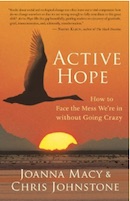 Joanna Macy and Stephen Johnston, Active Hope
Joanna Macy and Stephen Johnston, Active Hope
Here, Macy and Johnston offer the essential guidebook for everyone awakening to both the perils and potentials of our planetary moment. In this clearly written and compelling manual of cultural transformation, they guide us to find hope where we might least have thought to look — within our own hearts and souls, and in our interdependence with all life — and then to boldly act on that hope as visionary artisans of life-enhancing cultures. It skillfully addresses and transforms the major limiting beliefs that hold people back from wholehearted social action, which at its heart, requires that ‘active hope’ be sustained.
Going for Our Highest
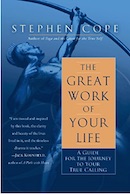 Stephen Cope, The Great Work of Your Life
Stephen Cope, The Great Work of Your Life
In order to have a fulfilling life you must discover the deep purpose hidden at the very core of your self. Cope describes the process of unlocking the unique possibility harbored within every human soul. The secret, he asserts, can be found in the pages of a two-thousand-year-old spiritual classic called the Bhagavad Gita—an ancient allegory about the path to dharma. Cope takes readers on a step-by-step tour of this revered tale, and in order to make it relevant to contemporary readers, he highlights well-known Western lives that embody its central principles—including Jane Goodall, whose life trajectory shows us the power of honoring The Gift; Walt Whitman, who listened for the call of the times; Susan B. Anthony, whose example demonstrates the power of focused energy; John Keats, who was able to let his desire give birth to aspiration; and Harriet Tubman, whose life was nothing if not a lesson in learning to walk by faith.
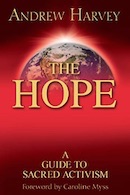
Andrew Harvey, The Hope, a Guide to Sacred Activism
The Hope provides a guide to discovering one’s divine purpose within a blueprint for a better world. Based on the concept of “sacred activism”, it presents a global initiative designed to save the human world from its downward spiral of greed, pain, and self-destruction. Sacred activism is about finding gratitude, forgiveness, and compassion; it is about opening up to the kindness within you, letting go of pain, and making a conscious choice to help heal the world. While the future may appear bleak, The Hope provides practical advice to all those who want positive change.
Intentional Eldering
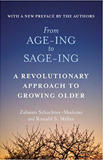 Zalman Schachter-Shalomi and Ronald Miller, From Aging to Sage-ing,
Zalman Schachter-Shalomi and Ronald Miller, From Aging to Sage-ing,
Sages expand their consciousness and develop wisdom. By expressing this wisdom as consecrated service to the community, they endow their lives with meaning and avoid becoming economic and psychological burdens on their loved ones and society. The model proposed restores the elder to a position of honor and dignity based on age and long life experience. It envisions the elder as an agent of evolution, attracted as much by the future of humanity’s expanded brain-mind potential as by the wisdom of the past. Once elders are restored to positions of leadership, they will function as wisdom keepers, inspiring all to live by higher values that will help convert our throwaway lifestyle into a more sustainable, Earth-cherishing one. The book is divided into three parts: the theory of spiritual eldering; spiritual eldering and personal transformation; and spiritual eldering and social transformation. It is the foundation for the Sage-ing International organization.
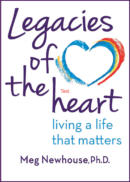 Margaret Newhouse, Legacies of the Heart: Living A Life That Matters
Margaret Newhouse, Legacies of the Heart: Living A Life That Matters
What legacies have you received and what will you pass on to leave the world a little better than you found it? In Legacies of the Heart, Meg Newhouse provides an unconventional compass to discover and shape your legacies. She guides us to a more conscious and heart-centered imprinting of our legacies on the memories and values of those we touch and in the material records we leave behind. While a remarkably rich resource, Legacies is not the typical how-to book. Much of its appeal lies in the illustrative personal stories Newhouse tells, her own as well as those of friends, clients, workshop participants, and people in the media. Through her invitation to reflect on these stories, she takes readers on a journey of transformational importance, not only for one generation but also for the generations that follow.
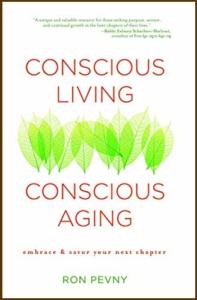 Ron Pevny, Conscious Living, Conscious Aging
Ron Pevny, Conscious Living, Conscious Aging
Ron presents a provocative new model for positive aging that focuses on the potential for growth, service, fulfillment, and spiritual exploration. It will help you distill wisdom from your life experiences, navigate loss and grief, identify new passions and goals, and remain engaged and relevant as you aim high, creating a lasting legacy and a healthier world for generations to come.
